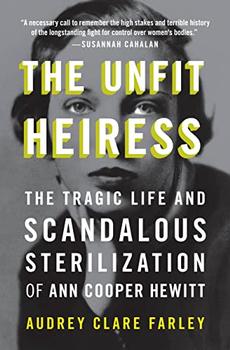Summary | Excerpt | Reading Guide | Reviews | Beyond the book | Read-Alikes | Genres & Themes | Author Bio

A Novel
by Ann LearyIt's the Roaring Twenties in America, a decade defined by hedonism on the one hand, and prohibition on the other. Though her father is still alive, Mary Engle has spent much of her childhood in a Catholic orphanage, shunted between the guardianship of nuns and her frosty, fault-finding aunt. Despite being recognized for her intelligence, Mary feels she has no real prospects. That is, until she unexpectedly lands a position as a secretary for the glamorous, imperious Dr. Agnes Vogel, the head of Nettleton State Village for Feebleminded Women of Childbearing Age. Mary is initially besotted with Dr. Vogel, whose professional achievements and university education fly in the face of expectations for women at the time. However, things take a turn for the sinister when Mary recognizes a girl she grew up with, Lillian Faust, among the supposedly "moronic" inpatients at the facility. Mary remembers Lillian as vivacious and troublemaking, but certainly not feebleminded. Surely there must have been some mistake? Mary's attempts to find out what happened to Lillian set her off on a dangerous path of discovery, exposing the dark heart of Nettleton Village. The Foundling by Ann Leary explores the exploitation of working-class girls at the time, whose so-called moral impropriety made them easy fodder for eugenicist experiments.
If you're thinking that segregating the "feebleminded" has ableist connotations to begin with, you're absolutely right, yet Leary doesn't spend too much time focusing on this aspect of the social implications of the period. Thematically, she's more interested in the idea that feminine sexual freedom was seen as a kind of mental disability, and should be commended for the way that she touches on the sexism, racism and classism prevalent in the novel's period setting. At the same time, the story is packed with action, romance and drama — perfect for a little bit of escapism, or a break from watching TV soaps. Like a sweet candy with a bitter center, The Foundling is a feminist horror story wrapped up in a beach read.
The most interesting part of the novel is the denialism that both Mary and Dr. Vogel engage in when working at the facility. In her fanatical devotion to the doctor, Mary almost becomes a villain at times. Seeing only what she wants to see, she continually performs mental gymnastics to justify the doctor's increasingly questionable behavior. Meanwhile, the slow unspooling of Vogel's darker beliefs clearly contradicts the story she tells about herself. Leary is excellent at portraying the perversion of a feminist cause, showing how those who claim to support women's advancement can still perpetuate the patriarchal logic that has long kept women down.
A downside to choosing a historical setting for a novel is that the reader is often ten steps ahead of the protagonist. It's difficult to build suspense with the benefit of hindsight, and so Mary's revelations do not come as much of a surprise. That said, Leary still provides a juicy, nail-biting ending that will have you turning pages when you should be asleep. Ultimately, the author has chosen a fascinating subject, one that is more than worth spending your time thinking about. The novel skates over many of the deeper aspects it introduces, but it's rich in complicated themes.
![]() This review was originally published in The BookBrowse Review in July 2022, and has been updated for the
April 2023 edition.
Click here to go to this issue.
This review was originally published in The BookBrowse Review in July 2022, and has been updated for the
April 2023 edition.
Click here to go to this issue.

If you liked The Foundling, try these:

by Audrey Farley
Published 2023
For readers of The Immortal Life of Henrietta Lacks and The Phantom of Fifth Avenue, a page-turning drama of fortunes, eugenics and women's reproductive rights framed by the sordid court battle between Ann Cooper Hewitt and her socialite mother.

by Dolen Perkins-Valdez
Published 2023
Inspired by true events that rocked the nation, a profoundly moving novel about a Black nurse in post-segregation Alabama who blows the whistle on a terrible wrong done to her patients, from the New York Times bestselling author of Wench.
Read the best books first, or you may not have a chance to read them at all.
Click Here to find out who said this, as well as discovering other famous literary quotes!
Your guide toexceptional books
BookBrowse seeks out and recommends the best in contemporary fiction and nonfiction—books that not only engage and entertain but also deepen our understanding of ourselves and the world around us.